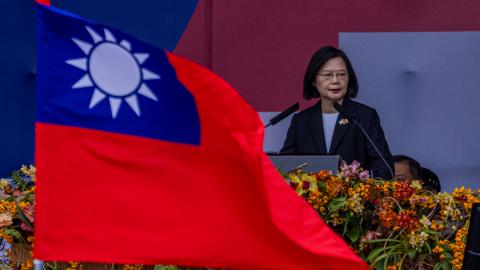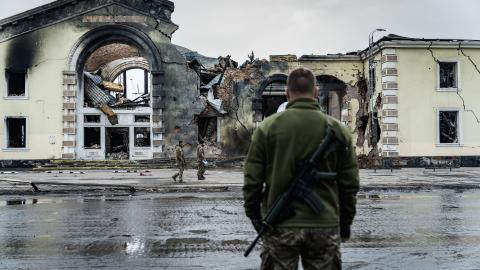ast week saw a rare demonstration of bipartisanship within the United States Congress when ninety Democrats and forty Republicans signed a joint letter urging the Barack Obama administration to label China a 'currency manipulator'. If the Chinese currency is infamously resistant to external political pressure, many believe that rising inflation in China--having reached 2.7 percent in February from 1.5 percent in January --could well do the trick. In theory, a stronger currency can help reduce the costs of imports. Even so, any reevaluation of the yuan will be insignificant meaning that the running battle between disgruntled American lawmakers and manufacturers against Chinese counterparts is due to intensify over 2010.
To be sure, inflation erodes not just purchasing power but regime legitimacy. After all, many Chinese protesters took to the streets across hundreds of towns and cities in 1989 to vent frustrations about rising prices rather than the lack of political reform. Moreover, there have been recent precedents for Beijing responding to rising prices by evaluating its currency upwards. The yuan gained 21 percent against the dollar from 2005-2008 following bouts of inflation that reached 4 percent at the end of 2004 and 5.6 percent in July 2007.
Additionally, Beijing accepts that a large reevaluation of the yuan upwards is in China's long-term interest. As Premier Wen himself admits, China's 'unbalanced' and 'unsustainable' economy depend too much on exports and fixed investments and not enough on domestic consumption. China imports around half of its basic consumer goods as well as fuel. Making imports cheaper through currency reevaluation would be one way of enhancing its citizens' purchasing power. Even so, there are several overriding reasons why any reevaluation of its currency by more than a few small percentage points is unlikely in the foreseeable future.
First, many Chinese Communist Party (CCP) officials--paranoid at the best of times--believe that Washington is attempting to manufacture a Chinese slowdown by pressuring Beijing over its currency. These officials see a precedent in the last time America pressured a rising Asian exporting giant to increase the value of its currency. Bowing to pressure, Tokyo eventually signed an accord with Washington in 1985, with the dollar falling from 240 to 160 yen from 1985-1987. When Japanese growth subsequently slowed, Tokyo boosted government spending and lowered interest rates--leading to the rise of a real estate bubble that eventually burst and is still haunting the Japanese economy today.
Conspiracy theories aside, China has its own property and stock market bubble to deflate following record government spending and bank lending (which state-controlled enterprises and local government officials have used to 'invest' in assets.) For example, housing starts almost doubled in 2009 from a year earlier and property prices in cities such as Shanghai and Beijing have risen around 50 percent in a matter of months; as have equity prices over the past 10 months. Beijing can ill-afford a further slowdown in its exports since it is already committed to deflating asset bubbles by decreasing both government spending and bank lending.
Second, Beijing still cares more about jobs than it does about inflation. Although the official unemployment figure is a respectable 4-5 percent, these figures only measure less than one tenth of the Chinese workforce. Local officials--and they should know--privately admit that it is likely more than double the official figure. For the moment, Beijing's political advisors believe that 3-5 percent inflation is 'politically manageable' as current levels are far short of the 19 percent inflation recorded just prior to the 1989 Tiananmen protests.
Bear in mind that the baseline figure of 8 percent GDP growth which Beijing believes is required for the CCP to retain its legitimacy is largely about producing enough jobs for the people. According to official figures, there were over 127,000 instances of 'mass unrest' in 2008, rising from 87,000 in 2005. The vast majority of these arise due to job losses (in addition to illegal land seizures.) An estimated 20-40 million export-related manufacturing jobs were lost during 2008-2009 which explains why Beijing abruptly put a stop to the yuan's gradual rise against the dollar in early 2008. The regime can hardly countenance any further damage to this sector.
Moreover, government policies enacted during the GFC has worked to strengthen the state sector at the expense of the private sector. For example, between 80-90 percent of the 2008-2009 stimulus and bank loans were offered to state-controlled enterprises. Private companies only received around 3-5 percent of all short term loans in 2009. While the state sector grew from 2008 onwards the Chinese private sector has actually shrunk in both relative and absolute terms--from an estimated 45 million private sector businesses in 2007 down to around 35-40 million currently. This is important since private businesses (both export and non-export sectors) in China are 2-3 times more efficient at job creation than the state-led sector. Subsequently, Beijing cannot rely on the expanded state-controlled sector to take up the slack of job creation should more export-related manufacturers lose employment.
Beijing's currency policy is ignoring the pleas of its own economists who have consistently counseled leaders to liberalise the yuan, or at least let it rise substantially. Given the obsessive but understandable focus on employment, this would first require more emphasis on China's vibrant private enterprise to drive job creation, leading to a gradual loosening of the Party's grip on economic power. Unfortunately, Beijing is unwilling to take such a 'political' risk.















